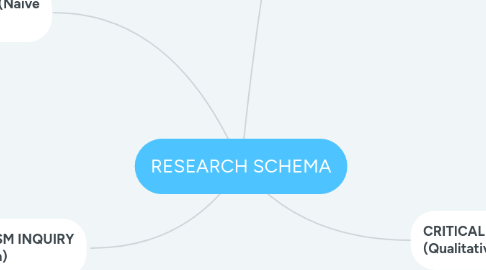
1. POSITIVISM INQUIRY (Naive Realism)
1.1. Predict & Control Phenomenon
1.2. Quantitative Studies
1.3. Deductive Reasoning, Verify theory
1.3.1. A true, identifiable, apprehendable, measureable reality
1.3.1.1. ETIC - Universal law application and Nomothetic - Abstract generalities that are predicted and explained
1.4. Cause & effect link to phenomenon
1.4.1. Epistemology is a detached researcher role, Distance between researcher and objective of study, Dual & objectivity, no place for researcher's values or emotions. Axiology, is strengthened through use of research assistants to keep biases at bay.
1.4.1.1. One true reality, Tightly controlled experiment, manipulation of one variable holding all other variables constant. Precise and scientific rhetorical structure, Strict scientific methodology
2. POST POSITIVISM INQUIRY (Critical Realism)
2.1. Reality perceived or understood imperfectly, not a true reality
2.1.1. Operates from an ETIC and Nomothetic perspective
2.2. Deductive Reasoning, Falsify theory
2.2.1. Reality observed apart from the individual
2.2.1.1. Axiology, No place for values in research. Use of Bracketing.
2.2.2. Quantitative Study
2.3. Phenomenon or realities are intractable - Predict & Control Phenomenon
2.3.1. Ontology, 1 true reality, but apprehendable and measured imperfectly. Use semi-structured interviews, multiple raters to identify a single approximate reality.
2.3.1.1. Epistemology, use of a modified dualism/objectivity. Researcher may have some influence on what is being researched.
2.4. Cause and effect link to phenomenon
2.4.1. Rhetorical Structure use is precise and scientific.
2.4.1.1. Methodology is a strict scientific method such as quasi-experiments
3. CONSTRUCTIVISM-INTERPRETIVIST INQUIRY (Relativist Position)
3.1. Idiographic and EMIC. Focused on understanding "lived experiences" Unique to an individual, social context...NOT Generalizable. Hidden meanings that must be unearthed. Use of deep reflection. Multiple constructed realities.
3.1.1. Qualitative Studies
3.1.2. Mental apparatus employed
3.1.3. Interaction between the researcher and research participant is crucial. Subject cannot be separated from the reality
3.1.3.1. Ontology, multiple constructed realities, rather than one true reality. Subjective and influenced by the context of the situation.
3.1.3.2. Epistemology, is concerned with transactional and subjective stance that maintains that reality is socially constructed. Dynamic interaction between researcher and research participant.
3.1.3.3. Axiology, researcher brackets values and lived experiences (ERLEBNIS) because researcher's values cannot be divorced from the research process. The use of a reflection journal is ideal.
3.1.3.4. Rhetorical Structure is written using the first person. Researcher owns experiences, expectations, biases and values and details them comprehensively.
3.1.3.5. Methodolgy, researcher embraces a naturalistic design due to the centrality of intense researcher/participant interaction and the need to be immersed in the study over longer periods of time.
4. CRITICAL THEORY INQUIRY (Qualitative Inquiry)
4.1. Researcher views reality in a historical, social context and power relationships. Researcher's values are central in the research task, purpose and methods. Constructed lived experiences mediated by power relations and dialectical interactions leading to emancipation from oppressive forces is a prominent reality.
4.1.1. Research used to form a cultural criticism
4.1.2. All thought is underscored by power relations and socially and historically instituted
4.1.3. Facts cannot be isolated from values
4.1.4. Language is central to the formation of subjectivity
4.1.5. Certain groups are more privileged than others
4.1.6. Oppression is at the expense of one over another
4.1.7. Mainstream research is generally implicated in the reproduction of systems of classes, race, and gender oppression

